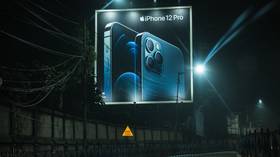Russian Market: Why the failure of a once-mighty tech giant is a cautionary tale for Apple

In the wild world of tech, even the big dogs can start tangoing on the edge of being yesterday's news if they don't keep up with the times. Apple, once a byword for innovation and market supremacy, now finds itself at a pivotal juncture, confronted by a daunting prospect: Could it follow the path trodden by Nokia, the erstwhile mobile phone juggernaut that ultimately faded into obscurity?
Apple stands on the brink of a new era, grappling with an amalgamation of challenges that transcend mere innovation and market domination. Beyond its perpetual quest for groundbreaking ideas and unswerving consumer devotion, the company finds itself entangled in a complex web of economic pressures. Inflation, the unrelenting force eroding purchasing power, has cast a shadow over the hallowed halls of Apple. As the prices of essential commodities scale unprecedented heights, Apple has taken a momentous step – the incorporation of titanium into the construction of its much-anticipated iPhone 15 Pro and iPhone 15 Pro Max models. This decision, however, does not unfold in isolation. It aligns with Apple's strategic pivot away from the Russian market, a move that inadvertently begets an artificial supply shortage.
Amid these complex dynamics, we are left pondering whether Apple, in its earnest pursuit of progress, might unwittingly retrace the footsteps of Nokia, the once-mighty giant that fell from grace.
At first glance, the parallels may seem distant. Apple, with its towering success and fervently devoted customer base, appears impervious to attack. Yet history reminds us that no enterprise, however formidable, is immune to the capricious winds of change.
Apple, renowned for its loyal user base, confronts a shifting landscape as even long-time customers contemplate alternatives. Incremental iPhone upgrades and lofty price tags have led many to cling to their current devices, while Android competitors lure users with innovation and customization. The expansion of non-Apple services has further nudged users to explore beyond the Apple ecosystem. This shift among existing users poses a challenge to Apple's quest for continued market dominance in an evolving tech world.
During the 1990s, Nokia and BlackBerry held undisputed sway in the mobile phone market, buoyed by dedicated customer bases that seemed immune to the demands of innovation. However, their decline began with the advent of the iPhone in 2007. Nokia's choice of the Windows operating system over Android, and BlackBerry's struggle to keep pace with the burgeoning smartphone trend, paved the way to their downfall.
Today, Apple grapples with challenges eerily reminiscent of its predecessors. The smartphone market is oversaturated, with competition from Android devices surging ahead. Like Nokia and BlackBerry in their heyday, Apple could witness a decline in significance unless it rekindles itself with innovative products and a customer-centric strategy.
The specter of complacency looms large, with Apple, under the leadership of Tim Cook, often opting for incremental tweaks to established products rather than embracing disruptive innovation. Should Apple fail to break free from this pattern, its gradual decline may eventually catch up, while other tech companies forge ahead.
Despite Apple's present achievements, including over 1.9 billion devices sold and a thriving community of app developers, the company grapples with declining iPhone sales and a diminishing market share. Rivals such as Samsung, armed with Android-powered devices featuring innovative capabilities and extensive developer opportunities, pose a genuine threat.
In a rapidly evolving tech landscape, resting on one's laurels becomes perilous. To sustain leadership and uphold its reputation as a technology innovator, Apple must transcend incremental tweaks, copycat products, or reclassification of existing services. It must pioneer an entirely novel product category, one that consumers can't imagine living without. Apple, once built on the foundation of innovation, now stands at a critical juncture. Without a resurgence of innovation, the future of Apple remains uncertain.
Apple's co-founder, Steve Jobs, famously declared, "Think Different." However, this motto seems to have waned in the past decade. The company that once led the pack in innovation now appears to be trailing.
The future of the iPhone hinges on how it responds to growing competition and whether it can meet consumer expectations in a saturated market. Apple's possible decline in the next five years, akin to Nokia and BlackBerry, underscores the dynamism of the smartphone industry. It remains to be seen if Apple can thrive in an increasingly saturated and fiercely competitive market demanding newer and more cost-effective products. Apple, once celebrated as an innovative frontrunner, boasting products years ahead of the competition in terms of technology, now faces questions about its ability to innovate in 2024.
Apple faces the formidable challenge of reinventing itself and tapping into new markets to maintain its competitive edge. In a rapidly changing tech landscape, Apple must heed the words of its co-founder, Steve Jobs: "I skate to where the puck is going to be, not where it has been." It remains to be seen whether Apple can rise to this challenge.
Founded by visionaries Steve Jobs, Steve Wozniak, and Ronald Wayne, Apple once ranked second in the world in terms of market capitalization, underscoring its dominance in the global economy.
Despite these successes, some have pointed out that Apple might be susceptible to the same mistakes that befell Nokia. One key area of concern is Apple's heavy reliance on iPhone sales, which accounted for approximately 60% of its revenue in recent years.
As Apple enters a new phase, the company must navigate several challenges to maintain its competitive edge. These include addressing its heavy dependence on iPhone sales, reinvigorating its innovation pipeline, and exploring emerging markets to drive growth. Only by embracing these changes can Apple hope to avoid the fate that befell Nokia.
In conclusion, while Apple's decline may not be imminent, the striking parallels with Nokia's downfall serve as a cautionary tale. The tech industry is ruthless, and even giants must adapt or face obsolescence. Apple's future hinges on its ability to rekindle the spirit of innovation that once defined the company. Will Apple rise to the occasion and continue to shape the tech landscape, or will it become the next Nokia, relegated to the annals of tech history? Only time will tell.














